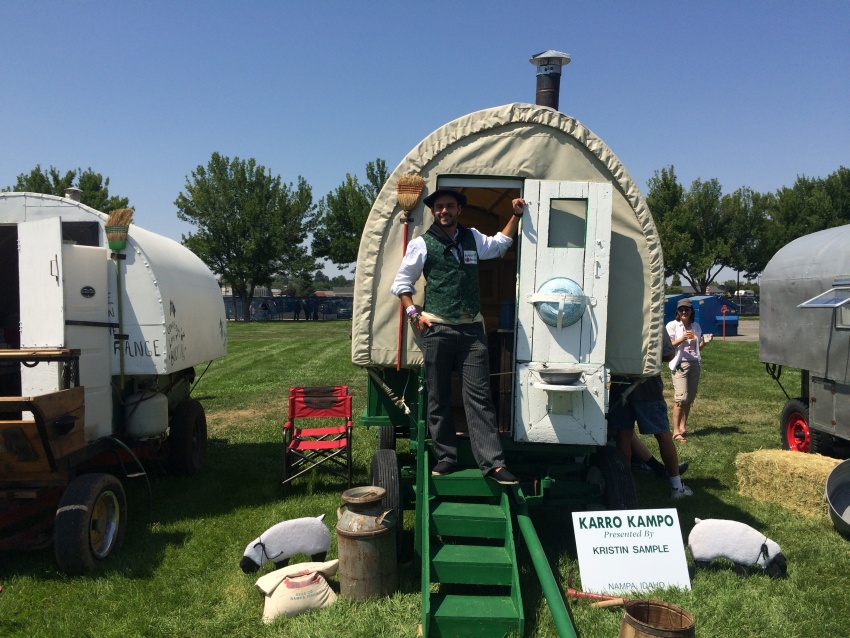Joseba Etxarri. With an undergraduate degree in Humanities and Communication, Iñaki Goikoetxea has published articles as a journalist and for two years had a scholarship to work at Directorate of the Basque Community Abroad in the Basque Government, putting him in touch with the Diaspora and Basque clubs around the world. A few years before, in 2010, he had visited his first Basque club, the Gure Txoko in Sydney, Australia, in a period he dedicated to travel and improve the English he began practicing on a stay in Wales with the Erasmus program. A concerned person with much initiative, his project Dancing in the Basque Country, a video of him dancing in hundreds different places in the Basque Country, was very popular a few years ago on Youtube, on Facebook and Twitter, reaching nearly a half million hits.
We saw you in Boise at Jaialdi.
-From 2012 to 2014 I worked in the Department of Foreign Action of the Basque Government on a scholarship which gave me the chance to visit three Basque clubs in the US, Rhode Island, Chino, CA and Colorado. I was left feeling that I wasn’t able to visit Boise or experience Jaialdi. That is when I decided to come this year with some friends, which we did, and had an extraordinary time, it met our highest expectations. We met a lot of people of all ages that were linked to the Basque worlds and we were all very happy. We found it to be vivid, rich and a pluralistic world that has given us four or five days, that sped by, that were mixed and colorful. We also had the opportunity to meet writers, singers, politicians, and artists first hand who in Euskadi we only see from afar. We also experienced the generosity of Basques Americans, who are always ready to help or explain things to us. I would also say that issues that are seen here as more important, there at a distance, can seem smaller. I think that it would be worthwhile to generate an environment here and have the ability to work together as I saw there.
You talk about a live plural world.
-In my opinion, when we talk about the Basque Diaspora, we are talking about a plural world. There is a variety of community and clubs. Similar but different at the same time, for example if we compare the Basque club in New York to that in Paris; in Europe, for example, Basque clubs like Barcelona or Paris are in permanent contact with youth who constantly visit the Basque Country, while in reality, at the largest and oldest Basque clubs in Argentina or South America it is different. For example in New England in the states, there is a group of people who settled there as pilotaris who played Jai-Alai, and their descendants, which are more like a big kuadrilla. The Basque clubs are places to get together where it is possible to cultivate common respect and to work together. Even though the tendency to idealize Euskadi exists, the same happens in Euskadi where the Diaspora is idealized. That is why I feel interaction is vital to have a mutual understanding, with programs for youth like Gaztemundu, but also to support any type of contact and exchanges, virtual as well as physical.
It doesn’t seem necessary to convince you that the Diaspora is an active part of the Basque Country.
-The Diaspora is and has been present throughout our History, even if there are people who don’t know about it well enough. Everyone has a family member, an uncle, grandfather, or great-grandmother, or some ancestor that has left the country and emigrated. In our towns there are thousands of contributions made by the Indianoak, the locals that emigrated, that have been supportive to our economy and social lives at some time in history. The Basques have been immigrating for years: all you have to do is remember the sheepherders in the West, or the sugar cane cutters in Australia or the dairies in Argentina….They were pioneers, remember for example the ship San Juan that is being researched in Canada. I think we have an obligation to get to know better that part of our history. On the other hand, there is no doubt that learning about it will give us a different perspective of oday's European reality and current immigration. The Basques have been a people of immigrants until very recently and have also traversed oceans and stations precariously, depending on solidarity. Sure we have also been there, and we were them, it may change the attitude of some when looking at the current immigrant and refugee situation in Europe and the world.
You recommend traveling, and to do so with eyes wide open.
-I think that it facilitates the process of training and personal growth, and to learn languages. To those of us who speak Basque and Spanish for example, I think it is important, in particular, to learn English but also French as a language that is also spoken in a part of our country. Today with the serious unemployment that our young people are facing, there are politicians who are proposing going abroad as a cure-all. What is for sure, is that things abroad are not simple, and above all when you are forced to leave, or are overwhelmed when doing so. But I also think that the Basque clubs may have an interesting role in regards to youth who travel abroad, through specific programs. I think that we should take advantage of our Basque club network, and adapt to the new needs that arise and use it boldly as an extension of our network of resources.






 Send to a friend
Send to a friend Add comment
Add comment








